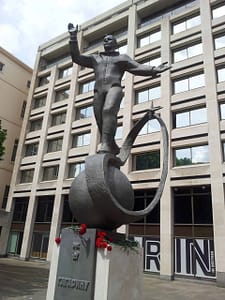 A British Interplanetary Society meeting with a difference. The venue is in the North of England – the historic city of York. You don’t have to be a BIS member – all with an interest in spaceflight are welcome. A day long event with five speakers on subjects that include Lunar dust, Soviet & German spaceflight, origins of the BIS and technical details behind the phenomenal success of the Apollo progam.
A British Interplanetary Society meeting with a difference. The venue is in the North of England – the historic city of York. You don’t have to be a BIS member – all with an interest in spaceflight are welcome. A day long event with five speakers on subjects that include Lunar dust, Soviet & German spaceflight, origins of the BIS and technical details behind the phenomenal success of the Apollo progam.
A summary below. Full details in the pdf indicated at the bottom of the page.
* * *
Date: Saturday 19th May 2011
Venue: Denham Room : Priory Street Centre, York , Y01 6ET
Cost: £5.00 – Full day event – Seating capacity limited to 50
Tickets – Book online here
Confirmed speakers
Deadly Lunar dust (Dr John Cain – UK Space Biomedicine Association). The first extraterrestrial material transported by man from an alien world to Earth was the almost 400kg of lunar rocks and dust. It is mysterious, fascinating but dangerous too. What were the hazards to the Apollo astronauts who brought it here and what has been learned by the scientist in the 40 years of laboratory experiments?
Origins of the BIS in the Northwest (Gurbir Singh – https://astrotalkuk.org). The BIS was founded in the northwest of England in 1933. The key players were Philip Cleater in Liverpool and from 1936 until the end of the war, Eric Burgess in Manchester. How did they realise their ambitious vision of establishing an Interplanetary Society a quarter century before a satellite was actually put into orbit?
How Apollo flew to the Moon (David Woods – How Apollo flew to the Moon). The Apollo program that took two dozen men to the Moon between 1968 and 1972 succeeded because of ingenious technological solutions developed rapidly midst the haste of the cold war. The author of the book, “How Apollo flew to the Moon ” explains the details of one of mankind’s most remarkable technological achievements.
China’s Long March to the Cosmos (Mike Hall – www. aelitauk.com) China was the third country to independently launch humans in to space. That was almost a decade ago. Further success has been swift, including a space walk and a woman in space. Current active programs include lunar orbiter, lunar lander, mission to Mars and a Space station. As we approach the 40th anniversary of the last men on the Moon, why is it that most experts believe that the next one will be Chinese?
German Rocket Development (Martin Dawson – York Astronomical Society). ‘Modern rocketry and spaceflight owe a lot to German rocket development of the 1920’s, ’30’s and ’40’s. Although born as a military weapon, scientists and engineers have turned this sword into a plough share. German rocketry is a story that should not be forgotten, it has highs and it has lows, but is always fascinating.
* * *
Download this pdf for all the details. This document is version 02. I will keep it updated from time to time with a final (version 1.0) by end of April.

 Next year April 12th 2011 marks the 50th anniversary of
Next year April 12th 2011 marks the 50th anniversary of